高一英语下情态动词
- 格式:ppt
- 大小:817.00 KB
- 文档页数:29

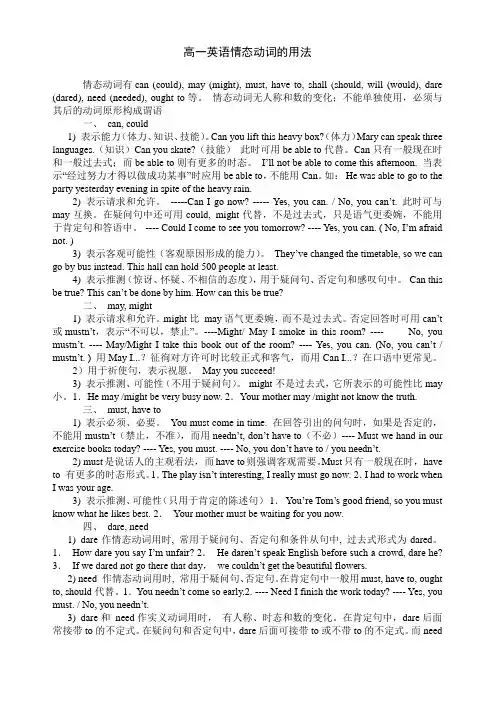
高一英语情态动词的用法情态动词有can (could), may (might), must, have to, shall (should, will (would), dare (dared), need (needed), ought to等。
情态动词无人称和数的变化;不能单独使用,必须与其后的动词原形构成谓语一、can, could1) 表示能力(体力、知识、技能)。
Can you lift this heavy box?(体力)Mary can speak three languages.(知识)Can you skate?(技能)此时可用be able to代替。
Can只有一般现在时和一般过去式;而be able to则有更多的时态。
I’ll not be able to come this afternoon. 当表示“经过努力才得以做成功某事”时应用be able to,不能用Can。
如:He was able to go to the party yesterday evening in spite of the heavy rain.2) 表示请求和允许。
-----Can I go now? ----- Y es, you can. / No, you can’t. 此时可与may互换。
在疑问句中还可用could, might代替,不是过去式,只是语气更委婉,不能用于肯定句和答语中。
---- Could I come to see you tomorrow? ---- Y es, you can. ( No, I’m afraid not. )3) 表示客观可能性(客观原因形成的能力)。
They’ve changed the timetable, so w e can go by bus instead. This hall can hold 500 people at least.4) 表示推测(惊讶、怀疑、不相信的态度),用于疑问句、否定句和感叹句中。
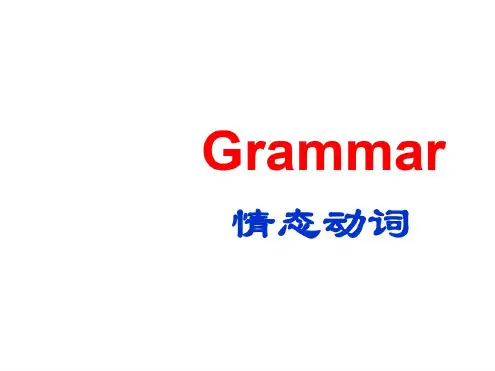
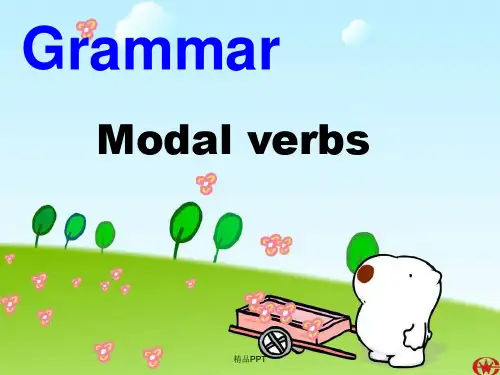
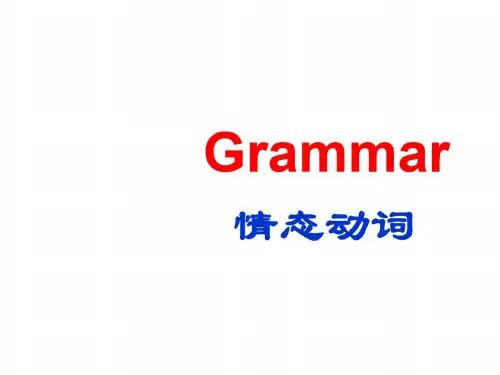
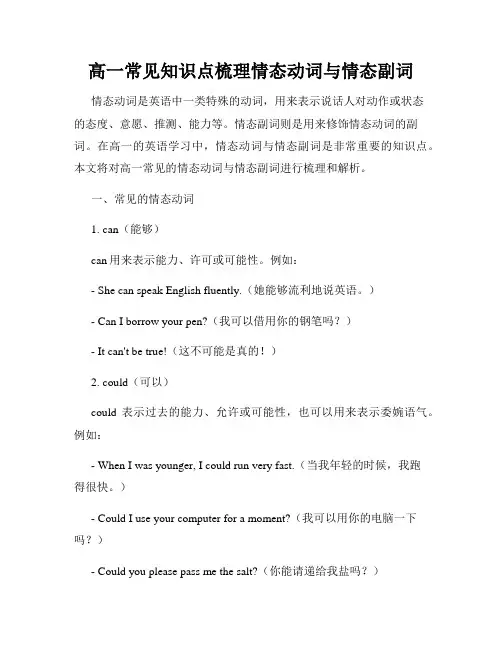
高一常见知识点梳理情态动词与情态副词情态动词是英语中一类特殊的动词,用来表示说话人对动作或状态的态度、意愿、推测、能力等。
情态副词则是用来修饰情态动词的副词。
在高一的英语学习中,情态动词与情态副词是非常重要的知识点。
本文将对高一常见的情态动词与情态副词进行梳理和解析。
一、常见的情态动词1. can(能够)can用来表示能力、许可或可能性。
例如:- She can speak English fluently.(她能够流利地说英语。
)- Can I borrow your pen?(我可以借用你的钢笔吗?)- It can't be true!(这不可能是真的!)2. could(可以)could表示过去的能力、允许或可能性,也可以用来表示委婉语气。
例如:- When I was younger, I could run very fast.(当我年轻的时候,我跑得很快。
)- Could I use your computer for a moment?(我可以用你的电脑一下吗?)- Could you please pass me the salt?(你能请递给我盐吗?)3. may(可能)may表示可能性、允许或请求的委婉语气。
例如:- It may rain tomorrow, so take your umbrella with you.(明天可能会下雨,所以记得带上雨伞。
)- May I go to the bathroom?(我可以去洗手间吗?)- May I have another piece of cake, please?(请问我可以再来一块蛋糕吗?)4. might(可能)might用来表示较小的可能性或建议。
例如:- It might rain later, so you should bring a raincoat.(天气可能会下雨,所以你应该带一件雨衣。
)- You might want to try the new restaurant downtown.(你可以试试市区的那家新餐厅。
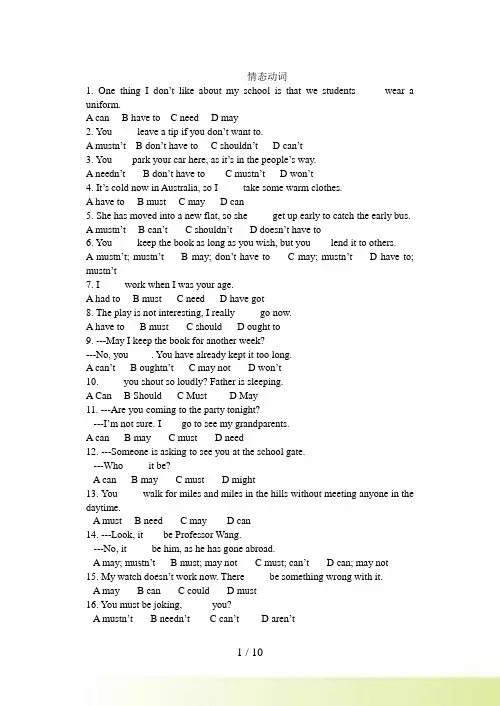
情态动词1. One thing I don’t like about my school is that we students ____ wear a uniform.A canB have toC needD may2. You ____ leave a tip if you don’t want to.A mustn’tB don’t have toC shouldn’tD can’t3. You ___ park your car here, as it’s in the people’s way.A needn’tB don’t have toC mustn’tD won’t4. It’s cold now in Australia, so I ____ take some warm clothes.A have toB mustC mayD can5. She has moved into a new flat, so she ____ get up early to catch the early bus.A must n’tB can’tC shouldn’tD doesn’t have to6. You ____ keep the book as long as you wish, but you ___ lend it to others.A must n’t; mustn’tB may; don’t have toC may; mustn’tD have to; mustn’t7. I ____ work when I was your age.A had toB mustC needD have got8. The play is not interesting, I really ____ go now.A have toB mustC shouldD ought to9. ---May I keep the book for another week?---No, you ____. You have already kept it too long.A can’tB oughtn’tC may notD won’t10. ____ you shout so loudly? Father is sleeping.A CanB ShouldC MustD May11. ---Are you coming to the party tonight?---I’m not sure. I ___ go to see my grandparents.A canB mayC mustD need12. ---Someone is asking to see you at the school gate.---Who ____ it be?A canB mayC mustD might13. You ____ walk for miles and miles in the hills without meeting anyone in the daytime.A mustB needC mayD can14. ---Look, it ___ be Professor Wang.---No, it ____ be him, as he has gone abroad.A may; mustn’tB must; may notC must; can’tD can; may not15. My watch doesn’t work now. There ____ be something wrong with it.A mayB canC couldD must16. You must be joking, _____ you?A mustn’tB needn’tC can’tD aren’t17. You must have known the result, ____ you?A mustn’tB can’tC haven’tD don’t18. John’s score on the test is the highest in the class; he ___ last night.A should studyB should have studiedC must have studiedD must have to study19. The room is in a terrible mess; it ____ cleaned.A can’t have beenB shouldn’t have beenC mustn’t have beenD wouldn’t have been20. Mary was not in her bedroom yesterday afternoon. She ___ in her classroom.A should have beenB must have beenC must beD should be21. One ought ____ for what one hasn’t done.A not to be punishedB to not be punishedC to not punishD not be punished22. Everyone ___ do his best for the modernizations lf our country.A canB mayC shouldD might23. ---I was too busy to help him with the problem.---But you ____.A ought toB shouldC ought to haveD should do24. You ____ take down the address, or you may forget where to go.A would ratherB needC would like toD had better25. Jenny ____ have kept her word. I wonder why she changed her mind.A mustB shouldC needD can26. Tom ought not to ____ me your secret, but he meant no harm.A have toldB tellC be tellingD having told27. I told Sally how to get there, but perhaps I ____ for her.A had to write it outB must have written it outC should have written it outD ought to write it out28. It’s nearly seven o’clock. Jack ____ be here at any moment.A mustB needC shouldD can29. ---When can I come for the photos? I need them tomorrow afternoon.---They ____ be ready by 12:00.A canB shouldC mightD need30. The old professor gave orders that the experiment ____ before 6:00.A was finishedB would finishC be finishedD shall be finished31. ---I go out to play now, Mum?---No. You ____. You should do your homework first.A Might; wouldn’tB May; had better notC Must; mustn’tD Need; mustn’t32. ---Oh, I’ve missed a good chance.---Yes. You ___ the chance when it came.A should have takenB should haveC might have takenD had taken33. You ought ____ for what you have done.A to not be punishedB not to be punishedC not be punishedD not punish34. I was really anxious about you. You ____ home without a word.A mustn’t leaveB shouldn’t have leftC couldn’t have leftD needn’t leave35. ----Do you think he is at home now?----I think he ____ be, for it’s ten o’clock now.A wouldB shouldC mightD ought to36. ---Let’s go out for a walk, shall we?---____.A No, I can’tB shouldC No, we’d better notD Yes, go ahead37. The plant is dead. I ___ it more water.A will giveB would have givenC must giveD should have given38. ---I telephoned you several times yesterday, but no one answered.---Oh, I ____ asleep.A must fallB must have fallenC should fallD should have fallen39. Johnny, you ____ play with the knife, you ____ hurt yourself.A won’t; can’tB shouldn’t; mustC can’t; shouldn’tD mustn’t; may40. Excuse me, you ____ enter the teachers’ office without permission.A oughtn’t toB won’tC needn’tD may not41. A computer ____ think for itself, it mist be told what to do.A can’tB couldn’tC may notD might not42. He ____ see a doctor before it is too late.A mustB must have toC needD need have to43. ---____ I stop here, sir?---No. Go on to the next paragraph, please.A WillB MayC WouldD Ought44. ---May I put my bike here?---No, you ___.A need n’tB can’tC mustn’tD aren’t able45. Our teachers are at work. You ____ make so much noise.A won’tB mustn’tC may notD needn’t46. I’m afraid it ____ rain tonight.A canB couldC may beD might47. Don’t be worried. The news ____ be true.A may notB mustn’tC needn’tD shan’t48. ---Must I write down the new words now?---_____.A No, you needn’tB No, you may notC No, you mustn’tD No, you can’t49. ---May I take this magazine out of the reading-room?---____.A Yes, you mayB No, you don’tC Yes, you doD Yes, you take5o. ---The room is so dirty. ____ we clean it?---Of course.A WillB ShallC WouldD Do51. Peter ____ come with us tonight, but he isn’t very sure yet.A mustB mayC canD will52. Michael ___ be a policeman, for he’s much too short.A needn’tB can’tC shouldD may53. ---Are you coming to Jeff’s party?---I’m not sure, I ___ go to the concert instead.A mustB wouldC shouldD might54. The fire spread through the hotel very quickly but everyone ____ get out.A had toB wouldC couldD was able to55. It’s nearly seven o’clock, Jack ___ be here at any moment.A mustB needC shouldD can56. There was plenty of time. She ____.A mustn’t have hurriedB couldn’t have hurriedC must not hurryD needn’t have hurried57. I didn’t see her in the meeting room this morning. She ____ at the meeting.A mustn’t have spokenB shouldn’t have spokenC needn’t have spokenD couldn’t have spoken58. He ____ you more help, even though he was very busy.A might have givenB might giveC may have givenD may give59. ---I stayed at a hotel while in New York.---Oh, did you? You ____ with Barbara.A could have stayedB could stayC would stayD must have stayed60. ---I heard they went skiing in the mountains last winter.---It ____ true because there was little snow there.A may not beB won’t beC couldn’t beD mustn’t be61.(全国高考题)—Is John coming by train?—He should,but he ________ not. He likes driving his car.A. mustB. canC. needD. may62.(北京春季高考题)—The room is so dirty. ________ we clean it?—Of course.A. WillB. ShallC. WouldD. Do63.(上海春季高考题)My English-Chinese dictionary has disappeared. Who ________ have taken it?A. shouldB. mustC. couldD. would64.(北京高考题)—I heard they went skiing in the mountains last winter.—It ________ true because there was little snow there.A. may not beB. won’t beC. couldn’t beD. mustn’t be65.(上海高考题)It has been announced that candidates ________ remain in their seats until all the papers have been collected.A. canB. willC. mayD. shall66.—There were already five people in the car but they managed to take me as well.—It ________ a comfortable journey.A. can’t beB. shouldn’t beC. mustn’t have beenD. couldn’t have been67.—Did the train arrive in time?—No. It ________ two hours ago.A. must have arriveB. ought to have arrivedC. must arriveD. ought to arrive68.—I can’t find my wallet.—You ________ it on the bus.A. must forgetB. must leaveC. must have forgottenD. must have left69.Such a businessman ________ be honest. He gets his money in a dishonest way.A. can’tB. mustn’t beC. may notD. shouldn’t70.Peter ________ come with us tonight,but he isn’t very sure yet.A. mustB. mayC. canD. will71.The girl used to be very interested in music, ________ she?A. didn’tB. useC. usedD. usedn’t to72.The old woman ________ sit there for hours,recalling her good old days.A. wouldB. usedC. used toD. could73.My watch is out of order. It needs ________.A. repairB. repairedC. repairingD. to repair74.It’s seven o’clock. Jack ________ be here at any moment.A. mustB. needC. shouldD. can75.It’s still early. You ________ hurry.A. mustn’tB. wouldn’tC. may notD. don’t have to76.—Do you think the flight is delayed?—It ________ be,especially in such weather.A. wouldB. shouldC. mightD. ought to77.Tom didn’t see her in the meeting room this morning. She ________ have spoken at the meeting.A. couldn’tB. mustn’tC. shouldn’tD. needn’t78.The light is still on. The student ________ to switch it off.A. must forgetB. must have forgottenC. might forgetD. may forget79.You must be a writer, ________ you?A. can’tB. aren’tC. mustD. mustn’t80.You ought ________ for what you are unable to do.A. not to be punishedB. to not be punishedC. to not punishedD. not be punished81.If you had been more careful enough,you ________ have made so many mistakes.A. won’tB. mustn’tC. shouldn’tD. wouldn’t82.—I hear you’ve got a set of valuable Australian coins. ________ I have a look?—Yes,certainly.A. MayB. DoC. ShallD. Should83.—Do you think I could borrow your dictionary?— ________ .A. Yes,you may borrowB. Yes,you couldC. Yes,go onD. Yes,help yourself84.The plant is dead. I ________ it more water.A. will giveB. would have givenC. must giveD. should have given85.You ________ return my umbrella now. You can keep it till next week if you like.A. can’tB. mustn’tC. needn’tD. may not86.Tom ought not to ________ me your secret,but he meant no harm.A. have toldB. tellC. be tellingD. having told87.He told Sally how to get there,but perhaps he ________ out for her.A. had to write itB. must have written itC. should have written itD. ought to write it88.Johnny, you ________ play with the knife; you ________ hurt yourself.A. won’t; can’tB. mustn’t; mayC. shouldn’t; mustD. can’t; shouldn’t89.It’s a fine day. Let’s go fishing, ________?A. won’t weB. will weC. don’t weD. shall we90.Be sure to write to us, ________ you?A. willB. aren’tC. canD. mustn’t91.—Would it bother you if I talk to you for a minute?— ________ .A. Yes,pleaseB. No,I don’tC. Yes,please don’tD. Not at all92.I ________ tell you what he did for fear that he should be angry with me.A. daren’tB. daren’t toC. dared not toD. dares not93.—I should have put on my coat when we left.—It’s a pity that you ________.A. didn’tB. don’tC. haven’tD. hadn’t94.—Aren’t you a football player?— ________ .A. Yes,I’m notB. Yes,I wasC. Oh,I used to beD. Oh,I used be95.If you really want yourself to be healthier,you must ________ always ________ so much.A. not; be smokingB. not; have smokedC. not; to smokeD. be not; smoking96.A computer ________ think for itself. It must be told what to do.A. can’tB. couldn’tC. may notD. might not97.—When can I come for the photos? I need them tomorrow afternoon.—They ________ be ready by 12:00.A. canB. shouldC. mightD. need98.I didn’t hear the phone. I ________ asleep.A. must beB. must have beenC. should beD. should have been99.He ________ you more help,even though he was very busy.A. might have givenB. might giveC. may have givenD. may give100.—Shall I turn on the television?—No,I ________ watch it now. I want to go to bed.A. shouldn’tB. couldn’tC. would rather notD. might not101.— ________ you make so much noise?—Sorry. I’ll take care not to.A. CanB. MustC. MayD. Would102.— Will you stay for lunch?—Sorry, ________. My brother is coming to see me.A. I mustn’tB. I can’tC. I needn’tD. I won’t103.The fire spread through the hotel very quickly but everyone ________ get out.A. had toB. wouldC. was able toD. could104.I was really anxious about you. You ________ home without a word.A. mustn’t leaveB. shouldn’t have leftC. couldn’t have leftD. needn’t leave105.I thought you ________ like something to read,so I have brought you some books.A. mayB. mightC. couldD. must106.—Sara has just come back from New York and she looks very happy.—She ________ her trip very much.A. might enjoyB. should have enjoyedC. might have enjoyedD. must enjoy107.You are doing in a wrong way. It ________ this way.A. used to doB. is used to doingC. used to be doneD. was used to doing108.— ________ Mary get disappointed if we tell her the news?—I think she ________.A. Will; mayB. Will; shallC. Shall; willD. Shall; need109.—Are you coming to Jeff’s party?—I’m not sure. I ________ go to the concert instead.A. mustB. wouldC. shouldD. might110.There was plenty of time. She ________.A. mustn’t have hurriedB. couldn’t have hurriedC. must not hurriedD. needn’t have hurriedKey1~5 BBCAD 6~10 CABAC 11~15 BACCD 16~20 DCCAB21~25 ACCDB 26~30 ACCBC 31~35 BABBB 36~40 CDBDA41~45 AABCB 46~50 DAAAB 51~55BBDDC 56~60 DDAAC1~5 DBCCD 6~10 DBDAB11~15 ACCCD 16~20 CABBA21~25 DADDC 26~30 ACBDA31~35 DAACA 36~40 ABBAC41~45 BBCBB 46~50 CCADD【解析】1.may表推测。
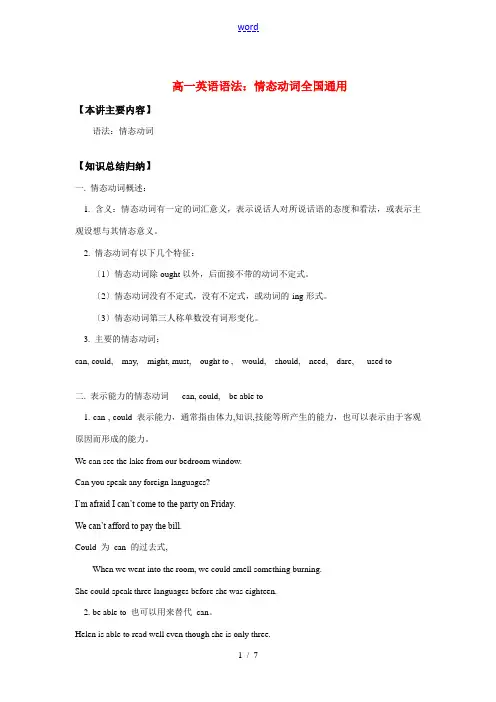
高一英语语法:情态动词全国通用【本讲主要内容】语法:情态动词【知识总结归纳】一. 情态动词概述:1. 含义:情态动词有一定的词汇意义,表示说话人对所说话语的态度和看法,或表示主观设想与其情态意义。
2. 情态动词有以下几个特征:〔1〕情态动词除ought以外,后面接不带的动词不定式。
〔2〕情态动词没有不定式,没有不定式,或动词的-ing形式。
〔3〕情态动词第三人称单数没有词形变化。
3. 主要的情态动词:can, could, may, might, must, ought to , would, should, need, dare, used to二. 表示能力的情态动词can, could, be able to1. can , could 表示能力,通常指由体力,知识,技能等所产生的能力,也可以表示由于客观原因而形成的能力。
We can see the lake from our bedroom window.Can you speak any foreign languages?I’m afraid I can’t come to the party on Friday.We can’t afford to pay the bill.Could 为can 的过去式,When we went into the room, we could smell something burning.She could speak three languages before she was eighteen.2. be able to 也可以用来替代can。
Helen is able to read well even though she is only three.I had some free time yesterday, so I was able to write a few letters.如果表示特定的能力时,应该用be able to,而不用can/couldThe fire spread through the building quickly but everybody was able to escape.They didn’t wan t to come with us at first but we managed to persuade them.Exercise: Fill in the blanks:1. Sandra __________ drive but she hasn’t got a car.2. My grandfather was a very clever man. He _________________ speak five languages.3. They didn’t wa nt to come with us at first but we ________ persuade them.4. Laura had hurt her leg and ______ walk very well.5. A girl fell into the river but fortunately we _______ rescue her.6. Can you speak up a bit? I _______ hear you very well.7. I used to _________ stand on my head but I can’t do it now.8. I looked very carefully and I _________ see a figure in the distance.三. should , ought to 表示应该,有责任,义务做某事。
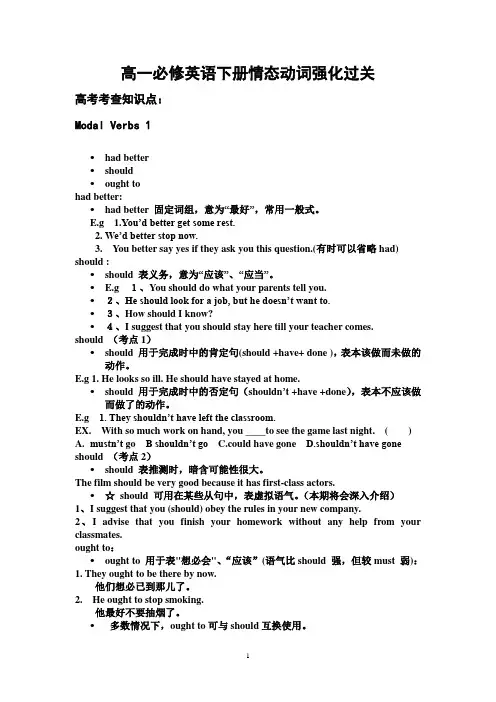
高一必修英语下册情态动词强化过关高考考查知识点:Modal Verbs 1•had better•should•ought tohad better:•had better 固定词组,意为“最好”,常用一般式。
E.g 1.You’d better get some rest.2. We’d better stop now.3. You better say yes if they ask you this question.(有时可以省略had) should :•should 表义务,意为“应该”、“应当”。
• E.g1、You should do what your parents tell you.•2、He should look for a job, but he doesn’t want to.•3、How should I know?•4、I suggest that you should stay here till your teacher comes.should (考点1)•should 用于完成时中的肯定句(should +have+ done ),表本该做而未做的动作。
E.g 1. He looks so ill. He should have stayed at home.•should 用于完成时中的否定句(shouldn’t +have +done),表本不应该做而做了的动作。
E.g 1. They shouldn’t have left the classroom.EX. With so much work on hand, you ____to see the game last night. ( ) A.mustn’t go B shouldn’t go C.could have gone D.shouldn’t have gone should (考点2)•should 表推测时,暗含可能性很大。
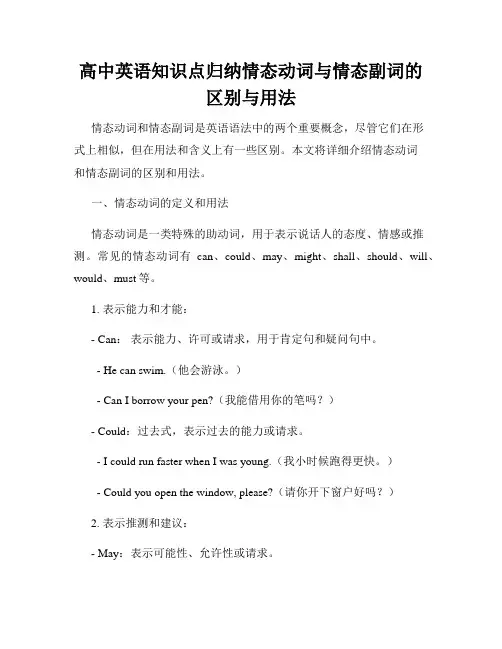
高中英语知识点归纳情态动词与情态副词的区别与用法情态动词和情态副词是英语语法中的两个重要概念,尽管它们在形式上相似,但在用法和含义上有一些区别。
本文将详细介绍情态动词和情态副词的区别和用法。
一、情态动词的定义和用法情态动词是一类特殊的助动词,用于表示说话人的态度、情感或推测。
常见的情态动词有can、could、may、might、shall、should、will、would、must等。
1. 表示能力和才能:- Can:表示能力、许可或请求,用于肯定句和疑问句中。
- He can swim.(他会游泳。
)- Can I borrow your pen?(我能借用你的笔吗?)- Could:过去式,表示过去的能力或请求。
- I could run faster when I was young.(我小时候跑得更快。
)- Could you open the window, please?(请你开下窗户好吗?)2. 表示推测和建议:- May:表示可能性、允许性或请求。
- It may rain tomorrow.(明天可能会下雨。
)- May I use your phone?(我可以用一下你的手机吗?)- Might:表示较小的可能性或社交礼貌。
- He might be at home.(他可能在家。
)- Might I have a glass of water, please?(我可以请你倒杯水吗?)3. 表示义务和建议:- Shall:主要用于疑问句或表示请求或建议。
- Shall we go now?(我们现在走吗?)- You shall do your homework.(你必须完成作业。
)- Should:表示应该、建议或责任。
- You should apologize.(你应该道歉。
)- She should study harder.(她应该更加努力学习。
)4. 表示必须和命令:- Must:表示必须、必要或断定。
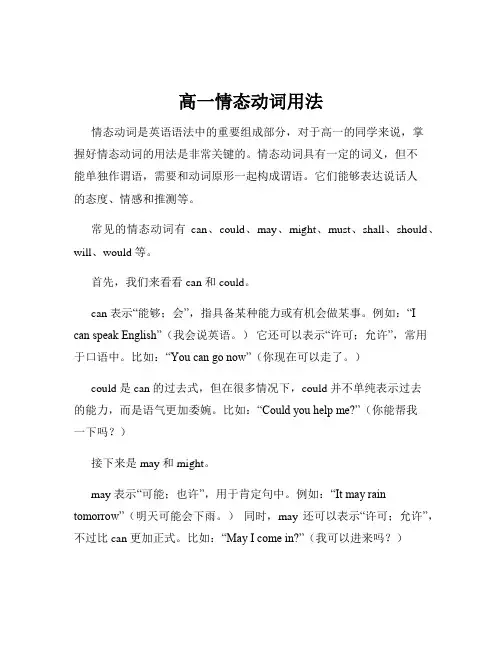
高一情态动词用法情态动词是英语语法中的重要组成部分,对于高一的同学来说,掌握好情态动词的用法是非常关键的。
情态动词具有一定的词义,但不能单独作谓语,需要和动词原形一起构成谓语。
它们能够表达说话人的态度、情感和推测等。
常见的情态动词有can、could、may、might、must、shall、should、will、would 等。
首先,我们来看看 can 和 could。
can 表示“能够;会”,指具备某种能力或有机会做某事。
例如:“I can speak English”(我会说英语。
)它还可以表示“许可;允许”,常用于口语中。
比如:“You can go now”(你现在可以走了。
)could 是 can 的过去式,但在很多情况下,could 并不单纯表示过去的能力,而是语气更加委婉。
比如:“Could you help me?”(你能帮我一下吗?)接下来是 may 和 might。
may 表示“可能;也许”,用于肯定句中。
例如:“It may rain tomorrow”(明天可能会下雨。
)同时,may 还可以表示“许可;允许”,不过比 can 更加正式。
比如:“May I come in?”(我可以进来吗?)might 是 may 的过去式,语气比 may 更加不确定和委婉。
例如:“He might be at home”(他也许在家。
)然后是 must。
must 表示“必须;一定”,强调主观上的必要性。
例如:“You must finish your homework before watching TV”(你必须在看电视之前完成作业。
)但要注意,must 的否定形式 mustn't 表示“禁止;不许”。
再来说说 shall 和 should。
shall 用于第一人称,表示征求对方的意见或向对方提出建议。
比如:“Shall we go shopping this afternoon?”(我们今天下午去购物好吗?)should 表示“应该;应当”,常用来给出建议或表达义务。
一、情态动词无人称和数的变化,不能单独做谓语,只能和行为动词或状态动词构成谓语二、情态动词分为:情态助动词:can(could)、may(might)、must、have to (had to )、ought to 、shall(should)、will(would) 12个半情态助动词:dare、need、used to、had better、would better(5个)三、情态助动词1.can and could1)ability:be able to do /manage to do/succeed in doing sth.eg.The army can defeat their enemy.eg.The army is able to defeat their enemy.eg.The army succeed in defeating their enemy.2)permission:eg.Can I smoke here?eg.You can’t smoke here.3)possibility:用在否定句、疑问句、感叹句中-eg.This can’t be done by him.当被用在肯定句中时,表达的是理论上的可能性,不涉及是否真的会发生eg.even expert drives can make mistakes.要表达现在或者将来的可能性,用may /might或could.eg.I may leave for Beijing next month.但在特殊疑问句中,或与副词hardly、only等连用的陈述句中表达可能性只用can/couldEg.where can the noise be coming from?eg.It can hardly be the postman,he comes only in the morning.4)有时会:the road can be blocked.5)could 表示轻微的怀疑或委婉的看法I’m sorry I couldn’t lend you the book now.His story could be true,but I hardly think it is.6)could 表示委婉的请求,主要用于疑问句,不用于肯定句Could you lend me some money?Yes,I can /No,I am afraid not.7)could 的常用结构:could+动词+比较级“非常,再.....不过了”It couldn’t be better.Couldn’t +过去分词+比较级“非常,再.....不过了”They couldn’t have tried harder to make me eel welcome.Can’t..too..=can never too“无论怎样...也不为过,越...越好”I can’t thank you too much.I owe my progress to you.Can’t (help/choose) but do/can but +动词原形“不得不,只好”We can but agree with him.Can’t help doing 忍不住,不得不I can’t help laughingCan’t be (it) 控制不住,没有办法It can’t be helpedCan’t....without 没有...就不能One can’t succeed without perseverance.2.may and might1)permission:May I use your pen?Yes,you may./No,you may not.2)Possibility:用于推测,表示不确定,不用于疑问句中She may know Tom’s address.出现I’m afraid.I’m not sure等表示不确定时,常用may/might.I’m afraid he might not come to attend the meeting today.从语气上判断,may表示的可能性比might 大,might更多的表示怀疑He may be very busy now.He might be very busy now.3)用于让步状语从句中However hard you may study,you cannot master English in a month.4)用于祈使句,表示祝愿May you succeed!5)might 常用于表示轻微的责备和委婉的请求You might post the letter for me if you are going near a post box.You might have let me know before!6)习惯用法:may as well do”理所当然,有足够的理由”She may be proud of her sonMay /might (just) as well do=had better do(最好)You might as well stay at home tonight.May/might as well+do A+as+do+B”与其做B不如做A”You might as well throw the money away as lend it to him.One may as well not know a thing at all as know it but imperfectly3.must and have to1)表示义务,一定要,必须You must arrive in good time.The meeting is very important.2)表示肯定性或难以避免,必然会,肯定会All men must die.3)must 表示有把握的推测,一定是,准时Must do/must be doing/must have doneThe tall fellow must be a basketball player.Let’s have something.You must be starving.He must have received mu letter which has mailed last week.4)must 表示非要,偏要,常以第二人称为主语,意指不耐或令人不愉快的事情,用于其他人称,表示主语固执,意为偏偏Why must you buy that car?Jane was never a pleasant young girl.After you gave her your advice,she must goand do the opposite.5)must 的三种否定形式表示不可能must be --can’t be must have done--can’t have doneYou must have met him before.You can’t have met him before.表示不必must do--need not to/don’t have toWe must get up at six tomorrow morning.We don’t have to get up at six tomorrow morning.表示决不能,严禁must--mustn’tYou mustn’t park your car here.6)回答以must提问的句子Must we clean all the rooms?Yes ,you must/No ,you don’t have to/No ,you needn’t7)must 可做名词,表示必须有的东西,必须做的事Warm clothes are a must in the mountains.8)must和have to 表示必须时,有一下差别Must 表示的是说话人主观的看法,而have to则往往强调客观需要The play is not interesting ,I really must go now.I have to work when I was your age.Must 一般只表现在,have to 则有更多的时态。
情态动词1. 情态动词的推测表达2. 情态动词表达虚拟语气3. 某些情态动词的特殊用法知识重点与难点总结知识重点:情态动词在表达推测意义的句子中的运用:(一)用情态动词表达事实的推测。
can,could,might,may,must可以用来表达对事实的推测。
根据说话人对事实的把握性大小,must表示“肯定…”,may / might / can / could表示“可能……”,must只用于肯定句中,may / might的否定式may not / might not表示“可能不……”, 而can / could可以用于疑问句,表示“可能,可能……吗?”,其否定式can’t / couldn’t 表示“不可能”。
用情态动词可以对现在或过去的事实进行推测。
对不同的时间内容推测有不同的结构。
(二)对现在的事实进行推测:主要结构:…must / may / might +动词原形be+名词/形容词/介词短语be + doing例句:1. You must be Jeanne. I’m Mathilde Loisel. We used to know each other very well.2. They must be in bed already at this time of the night.3. The teacher must be joking.4. Freda isn’t in class. She must be sick.5. There must be something wrong.6. She might be very clever, but she hasn’t got much common sense.7. He may be arriving this evening.8. He may be traveling around the world.9. The keys can’t be in the room. I have just searched it very carefully.10. Can the news be true ?(三)对过去的事实进行推测:结构:情态动词+have done / been+名词/形容词/介词短语例句:1. Mrs. Longmans must have been a pretty girl in her youth.2. He couldn’t have seen Anna yesterday. She’s gone abroad.3. I think I must have left my glasses in the library.4. He might have overslept again.5. Where can Tom have gone ?情态动词表达虚拟语气:表达“本来…”,“不然早就…”。
高一情态动词用法例句情态动词是英语语法中的重要组成部分,对于高一的同学来说,掌握它们的用法是非常关键的。
情态动词本身有一定的词义,表示说话人的情绪、态度或语气,但不能单独作谓语,只能和其他动词原形一起构成谓语。
先来说说“can”和“could”。
“can”表示能力,意为“能,会”。
比如:“I can speak English”(我会说英语。
)它还可以表示许可,“You can go now”(你现在可以走了。
)“could”是“can”的过去式,语气比“can”更加委婉。
例如:“Could you help me?”(你能帮我一下吗?)接着是“may”和“might”。
“may”表示许可或可能性,“You may come in”(你可以进来。
)“might”是“may”的过去式,语气更加委婉、不确定。
“He might be at home”(他可能在家。
)“must”表示必须,强调主观上的必要。
“We must study hard”(我们必须努力学习。
)其否定形式“mustn't”表示“禁止,不许”。
“You mustn't smoke here”(你不许在这里抽烟。
)“should”和“ought to”都有“应该”的意思。
“You should keep your promise”(你应该信守承诺。
)“ought to”语气更强些,“We ought to help each other”(我们应该互相帮助。
)“will”和“would”。
“will”用于一般将来时,表示将来的动作或状态,“I will go to Beijing tomorrow”(我明天去北京。
)“would”是“will”的过去式,用于过去将来时,同时也可以表示委婉的请求或意愿。
“Would you like some coffee?”(你想要些咖啡吗?)再看“need”,作情态动词时,常用于否定句和疑问句中,“You needn't worry”(你不必担心。
注:尊敬的各位读者,本文是笔者教育资料系列文章的一篇,由于时间关系,如有相关问题,望各位雅正。
希望本文能对有需要的朋友有所帮助。
如果您需要其它类型的教育资料,可以关注笔者知识店铺。
由于部分内容来源网络,如有部分内容侵权请联系笔者。
情态动词1. One thing I don’t like about my school is that we students ____ wear a uniform.A canB have toC needD may2. You ____ leave a tip if you don’t want to.A mustn’tB don’t have toC shouldn’tD can’t3. You ___ park your car here, as it’s in the people’s way.A needn’tB don’t have toC mustn’tD won’t4. It’s cold now in Australia, so I ____ take some warm clothes.A have toB mustC mayD can5. She has moved into a new flat, so she ____ get up early to catch the early bus.A must n’tB can’tC shouldn’tD doesn’t have to6. You ____ keep the book as long as you wish, but you ___ lend it to others.A must n’t; mustn’tB may; don’t have toC may; mustn’tD have to; mustn’t7. I ____ work when I was your age.A had toB mustC needD have got8. The play is not interesting, I really ____ go now.A have toB mustC shouldD ought to9. ---May I keep the book for another week?---No, you ____. You have already kept it too long.A can’tB oughtn’tC may notD won’t10. ____ you shout so loudly? Father is sleeping.A CanB ShouldC MustD May11. ---Are you coming to the party tonight?---I’m not sure. I ___ go to see my grandparents.A canB mayC mustD need12. ---Someone is asking to see you at the school gate.---Who ____ it be?A canB mayC mustD might13. You ____ walk for miles and miles in the hills without meeting anyone in the daytime.A mustB needC mayD can14. ---Look, it ___ be Professor Wang.---No, it ____ be him, as he has gone abroad.A may; mustn’tB must; may notC must; can’tD can; may not15. My watch doesn’t work now. There ____ be something wrong with it.A mayB canC couldD must16. You must be joking, _____ you?A mustn’tB needn’tC can’tD aren’t17. You must have known the result, ____ you?A mustn’tB can’tC haven’tD don’t18. John’s score on the test is the highest in the class; he ___ last night.A should studyB should have studiedC must have studiedD must have to study19. The room is in a terrible mess; it ____ cleaned.A can’t have beenB shouldn’t have beenC mustn’t have beenD wouldn’t have been20. Mary was not in her bedroom yesterday afternoon. She ___ in her classroom.A should have beenB must have beenC must beD should be21. One ought ____ for what one hasn’t done.A not to be punishedB to not be punishedC to not punishD not be punished22. Everyone ___ do his best for the modernizations lf our country.A canB mayC shouldD might23. ---I was too busy to help him with the problem.---But you ____.A ought toB shouldC ought to haveD should do24. You ____ take down the address, or you may forget where to go.A would ratherB needC would like toD had better25. Jenny ____ have kept her word. I wonder why she changed her mind.A mustB shouldC needD can26. Tom ought not to ____ me your secret, but he meant no harm.A have toldB tellC be tellingD having told27. I told Sally how to get there, but perhaps I ____ for her.A had to write it outB must have written it outC should have written it outD ought to write it out28. It’s nearly seven o’clock. Jack ____ be here at any moment.A mustB needC shouldD can29. ---When can I come for the photos? I need them tomorrow afternoon.---They ____ be ready by 12:00.A canB shouldC mightD need30. The old professor gave orders that the experiment ____ before 6:00.A was finishedB would finishC be finishedD shall be finished31. ---I go out to play now, Mum?---No. You ____. You should do your homework first.A Might; wouldn’tB May; had better notC Must; mustn’tD Need; mustn’t32. ---Oh, I’ve missed a good chance.---Yes. You ___ the chance when it came.A should have takenB should haveC might have takenD had taken33. You ought ____ for what you have done.A to not be punishedB not to be punishedC not be punishedD not punish34. I was really anxious about you. You ____ home without a word.A mustn’t leaveB shouldn’t have leftC couldn’t have leftD needn’t leave35. ----Do you think he is at home now?----I think he ____ be, for it’s ten o’clock now.A wouldB shouldC mightD ought to36. ---Let’s go out for a walk, shall we?---____.A No, I can’tB shouldC No, we’d better notD Yes, go ahead37. The plant is dead. I ___ it more water.A will giveB would have givenC must giveD should have given38. ---I telephoned you several times yesterday, but no one answered.---Oh, I ____ asleep.A must fallB must have fallenC should fallD should have fallen39. Johnny, you ____ play with the knife, you ____ hurt yourself.A won’t; can’tB shouldn’t; mustC can’t; shouldn’tD mustn’t; may40. Excuse me, you ____ enter the teachers’ office without permission.A oughtn’t toB won’tC needn’tD may not41. A computer ____ think for itself, it mist be told what to do.A can’tB couldn’tC may notD might not42. He ____ see a doctor before it is too late.A mustB must have toC needD need have to43. ---____ I stop here, sir?---No. Go on to the next paragraph, please.A WillB MayC WouldD Ought44. ---May I put my bike here?---No, you ___.A need n’tB can’tC mustn’tD aren’t able45. Our teachers are at work. You ____ make so much noise.A won’tB mustn’tC may notD needn’t46. I’m afraid it ____ rain tonight.A canB couldC may beD might47. Don’t be worried. The news ____ be true.A may notB mustn’tC needn’tD shan’t48. ---Must I write down the new words now?---_____.A No, you needn’tB No, you may notC No, you mustn’tD No, you can’t49. ---May I take this magazine out of the reading-room?---____.A Yes, you mayB No, you don’tC Yes, you doD Yes, you take5o. ---The room is so dirty. ____ we clean it?---Of course.A WillB ShallC WouldD Do51. Peter ____ come with us tonight, but he isn’t very sure yet.A mustB mayC canD will52. Michael ___ be a policeman, for he’s much too short.A needn’tB can’tC shouldD may53. ---Are you coming to Jeff’s party?---I’m not sure, I ___ go to the concert instead.A mustB wouldC shouldD might54. The fire spread through the hotel very quickly but everyone ____ get out.A had toB wouldC couldD was able to55. It’s nearly seven o’clock, Jack ___ be here at any moment.A mustB needC shouldD can56. There was plenty of time. She ____.A mustn’t have hurriedB couldn’t have hurriedC must not hurryD needn’t have hurried57. I didn’t see her in the meeting room this morning. She ____ at the meeting.A mustn’t have spokenB shouldn’t have spokenC needn’t have spokenD couldn’t have spoken58. He ____ you more help, even though he was very busy.A might have givenB might giveC may have givenD may give59. ---I stayed at a hotel while in New York.---Oh, did you? You ____ with Barbara.A could have stayedB could stayC would stayD must have stayed60. ---I heard they went skiing in the mountains last winter.---It ____ true because there was little snow there.A may not beB won’t beC couldn’t beD mustn’t be61.(2002全国高考题)—Is John coming by train?—He should,but he ________ not. He likes driving his car.A. mustB. canC. needD. may62.(2003北京春季高考题)—The room is so dirty. ________ we clean it?—Of course.A. WillB. ShallC. WouldD. Do63.(2003上海春季高考题)My English-Chinese dictionary has disappeared. Who ________ have taken it?A. shouldB. mustC. couldD. would64.(2002北京高考题)—I heard they went skiing in the mountains last winter.—It ________ true because there was little snow there.A. may not beB. won’t beC. couldn’t beD. mustn’t be65.(2002上海高考题)It has been announced that candidates ________ remain in their seats until all the papers have been collected.A. canB. willC. mayD. shall66.—There were already five people in the car but they managed to take me as well.—It ________ a comfortable journey.A. can’t beB. shouldn’t beC. mustn’t have beenD. couldn’t have been67.—Did the train arrive in time?—No. It ________ two hours ago.A. must have arriveB. ought to have arrivedC. must arriveD. ought to arrive68.—I can’t find my wallet.—You ________ it on the bus.A. must forgetB. must leaveC. must have forgottenD. must have left69.Such a businessman ________ be honest. He gets his money in adishonest way.A. can’tB. mustn’t beC. may notD. shouldn’t70.Peter ________ come with us tonight,but he isn’t very sure yet.A. mustB. mayC. canD. will71.The girl used to be very interested in music, ________ she?A. didn’tB. useC. usedD. usedn’t to72.The old woman ________ sit there for hours,recalling her good old days.A. wouldB. usedC. used toD. could73.My watch is out of order. It needs ________.A. repairB. repairedC. repairingD. to repair74.It’s seven o’clock. Jack ________ be here at any moment.A. mustB. needC. shouldD. can75.It’s still early. You ________ hurry.A. mustn’tB. wouldn’tC. may notD. don’t have to76.—Do you think the flight is delayed?—It ________ be,especially in such weather.A. wouldB. shouldC. mightD. ought to77.Tom didn’t see her in the meeting room this morning. She ________ have spoken at the meeting.A. couldn’tB. mustn’tC. shouldn’tD. needn’t78.The light is still on. The student ________ to switch it off.A. must forgetB. must have forgottenC. might forgetD. may forget79.You must be a writer, ________ you?A. can’tB. aren’tC. mustD. mustn’t80.You ought ________ for what you are unable to do.A. not to be punishedB. to not be punishedC. to not punishedD. not be punished81.If you had been more careful enough,you ________ have made so many mistakes.A. won’tB. mustn’tC. shouldn’tD. wouldn’t82.—I hear you’ve got a set of valuable Australian coins. ________ I have a look?—Yes,certainly.A. MayB. DoC. ShallD. Should83.—Do you think I could borrow your dictionary?—________ .A. Yes,you may borrowB. Yes,you couldC. Yes,go onD. Yes,help yourself84.The plant is dead. I ________ it more water.A. will giveB. would have givenC. must giveD. should have given85.You ________ return my umbrella now. You can keep it till next week if you like.A. can’tB. mustn’tC. needn’tD. may not86.Tom ought not to ________ me your secret,but he meant no harm.A. have toldB. tellC. be tellingD. having told87.He told Sally how to get there,but perhaps he ________ out for her.A. had to write itB. must have written itC. should have written itD. ought to write it88.Johnny, you ________ play with the knife; you ________ hurt yourself.A. won’t; can’tB. mustn’t; mayC. shouldn’t; mustD. can’t; shouldn’t89.It’s a fine day. Let’s go fishing, ________?A. won’t weB. will weC. don’t weD. shall we90.Be sure to write to us, ________ you?A. willB. aren’tC. canD. mustn’t91.—Would it bother you if I talk to you for a minute?—________ .A. Yes,pleaseB. No,I don’tC. Yes,please don’tD. Not at all92.I ________ tell you what he did for fear that he should be angry with me.A. daren’tB. daren’t toC. dared not toD. dares not93.—I should have put on my coat when we left.—It’s a pity that you ________.A. didn’tB. don’tC. haven’tD. hadn’t94.—Aren’t you a football player?—________ .A. Yes,I’m notB. Yes,I wasC. Oh,I used to beD. Oh,I used be95.If you really want yourself to be healthier,you must ________ always ________ so much.A. not; be smokingB. not; have smokedC. not; to smokeD. be not; smoking96.A computer ________ think for itself. It must be told what to do.A. can’tB. couldn’tC. may notD. might not97.—When can I come for the photos? I need them tomorrow afternoon.—They ________ be ready by 12:00.A. canB. shouldC. mightD. need98.I didn’t hear the phone. I ________ asleep.A. must beB. must have beenC. should beD. should have been99.He ________ you more help,even though he was very busy.A. might have givenB. might giveC. may have givenD. may give100.—Shall I turn on the television?—No,I ________ watch it now. I want to go to bed.A. shouldn’tB. couldn’tC. would rather notD. might not101.—________ you make so much noise?—Sorry. I’ll take care not to.A. CanB. MustC. MayD. Would102.—Will you stay for lunch?—Sorry, ________. My brother is coming to see me.A. I mustn’tB. I can’tC. I needn’tD. I won’t103.The fire spread through the hotel very quickly but everyone ________ get out.A. had toB. wouldC. was able toD. could104.I was really anxious about you. You ________ home without a word.A. mustn’t leaveB. shouldn’t have leftC. couldn’t have leftD. needn’t leave105.I thought you ________ like something to read,so I have brought you some books.A. mayB. mightC. couldD. must106.—Sara has just come back from New York and she looks very happy.—She ________ her trip very much.A. might enjoyB. should have enjoyedC. might have enjoyedD. must enjoy107.You are doing in a wrong way. It ________ this way.A. used to doB. is used to doingC. used to be doneD. was used to doing108.—________ Mary get disappointed if we tell her the news?—I think she ________.A. Will; mayB. Will; shallC. Shall; willD. Shall; need 109.—Are you coming to Jeff’s party?—I’m not sure. I ________ go to the concert instead.A. mustB. wouldC. shouldD. might110.There was plenty of time. She ________.A. mustn’t have hurriedB. couldn’t have hurriedC. must not hurriedD. needn’t have hurriedKey1~5 BBCAD 6~10 CABAC 11~15 BACCD 16~20 DCCAB21~25 ACCDB 26~30 ACCBC 31~35 BABBB 36~40 CDBDA41~45 AABCB 46~50 DAAAB 51~55BBDDC 56~60 DDAAC1~5 DBCCD 6~10 DBDAB11~15 ACCCD 16~20 CABBA21~25 DADDC 26~30 ACBDA31~35 DAACA 36~40 ABBAC41~45 BBCBB 46~50 CCADD【解析】1.may表推测。